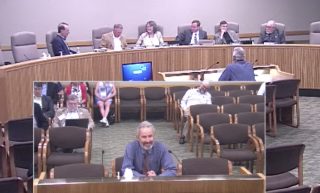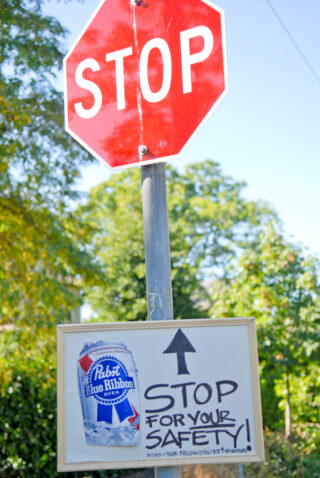It’s not the Idaho Stop, but a law that would allow bicycle users to treat stop signs and flashing red signals as yields (when safe, of course) would be a major step forward for bicycle users in Oregon. And it just moved one major step closer to passage as the 2019 session rolls into its final few weeks.
Senate Bill 998 passed the Senate Rules Committee yesterday by a vote of 4-1. This comes two months after it passed the Senate Judiciary Committee.
Lane County Senator Floyd Prozanski — who introduced a bill inspired by Idaho’s law in 2003 — was the sole person to testify at the committee hearing yesterday. “What Idaho has is much broader than what’s been introduced here, he explained to the committee. “It [Idaho’s law] also allows bicycle riders to do the same [yield] at red lights. I believe that’s too far to go at this stage and that’s why we should follow what would be more the Delaware model.”
Delaware passed their law, which they call the “Delaware yield”, in 2017.
According to Prozanski, the main benefit of this law is that it would allow people on bicycles to maintain momentum at intersections and therefore be less likely to suffer from a collision or close-call. When bicycle riders come to a complete stop, the act of starting up again can make them vulnerable to being hit by other road users who can increase speed more quickly and easily.
Only two of the five senators on the committee made a comment before filing their vote. Republican Sen. Herman Baertschiger (Grants Pass) voted in favor of the bill. “If you want to ride your bicycle through a stop sign; very good,” he said, “But I would strongly suggest if you’re riding around the capitol today with all these log trucks [being driven around in protest of Oregon’s pending climate legislation], today wouldn’t be good day to do it.” Then everyone laughed.
Advertisement

(Screenshot from Oregon Legislative Information System website)
Committee Chair Senator Ginny Burdick said she feels the bill will be a boon for riders who click into their pedals with cleats. Removing feet from cleats at every stop sign can “sometimes be dangerous for those of us who are not particularly skilled,” she said; then added, “I will also point out that if anyone messes up it’s the bicyclist that pays the price, not the driver.”
Prozanski told his colleagues an additional benefit of the bill would be that more bicycle riders would stay away from more heavily congested streets and opt for residential ones if they knew they treat stop signs as yields.
Sen. Brian Boquist (R-Dallas) was the sole no vote. He didn’t explain why.
To clarify what SB 998 would do, below is the description taken from the official summary published by the Senate Rules Committee:
Senate Bill 998 A allows a bicyclist approaching an intersection regulated by a stop sign or flashing red light at a safe speed to proceed through that intersection or make a turn without stopping. It also creates traffic violation of improper entry into an intersection controlled by a stop sign and improper entry into an intersection controlled by a flashing red light. A violation of either occurs when a bicyclist fails to yield to traffic within the intersection or to traffic that is approaching so close as to constitute an immediate hazard, disobeys a police officer or flagger, fails to exercise care to avoid an accident, or fails to yield the right of way to a pedestrian. SB 998 A makes a violation of either a Class D traffic violation.
This is the third time Oregon has tried to pass a bill like this. Prozanski’s first attempt failed in 2003. Advocates tried again in 2009 but it didn’t have enough support.
From here the bill will move to the Senate floor for a vote. Assuming it passes it would then be referred to the House Rules Committee before it could advance to the House floor. Once it moves to the House, it will be imperative for supporters of the bill to make their voices heard. The end of the 2019 session is constitutionally set for June 30th, but there are rumors it could end even sooner.
Timing will be key. Hopefully the bill can keep moving through the process without coming to a complete stop.
In other legislative news, SB 558 — the bill that would allow any city in Oregon to reduce the speed limit on residential streets by 5 mph — is nearing a final vote in the House.
— Jonathan Maus: (503) 706-8804, @jonathan_maus on Twitter and jonathan@bikeportland.org
Never miss a story. Sign-up for the daily BP Headlines email.
BikePortland needs your support.


